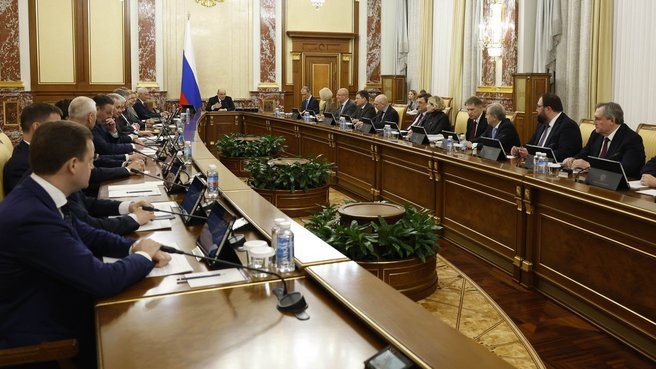Agenda: Organising medical assistance in the new regions, improving tools of state financial control, expanding the Arctic zone.
Mikhail Mishustin’s opening remarks:
Good afternoon, colleagues.
Today we celebrate the birthday of our colleague, Transport Minister Vitaly Savelyev. Mr Savelyev is in charge of a very important area: he oversees the development of Russia’s transport complex and deals with tasks to increase the connectivity of our vast country.
His extensive work experience, his personal and business qualities and the energy that Mr Savelyev has always shown in all the work he has undertaken will undoubtedly continue to serve him well in his business and all future endeavors. On behalf of myself and the Government, I want to wish you luck, good health, family warmth, and all the best. Happy birthday, Mr Savelyev!
Before we begin with the main agenda, I want to say a few words about the decision adopted to organise medical assistance for our citizens in the new regions.
The launch of the nationwide mandatory medical insurance system is continuing in the new territories. It is very important that during the transition period, social obligations are fulfilled, so that people can visit outpatient clinics and hospitals and receive free medical treatment, including high-tech services.
To that end, the Government adopted the rules for funding medical assistance for the residents of the Donetsk and Lugansk people’s republics, and the Zaporozhye and Kherson regions in the current year.
Almost 39 billion roubles will be allocated for this purpose. This amount will be disbursed through incremental intra-budget transfers directly from the Mandatory Medical Insurance Fund.
I ask the heads of the new regions to take personal responsibility for the implementation of the basic mandatory medical insurance programme. People’s health needs must not remain unattended, and require the attention and care of medical personnel and doctors.
Now, let us move on to the main agenda.
The Government is allocating substantial resources for the development of projects that help improve the lives of our people. We want to spend each rouble as effectively as possible, and we will expand state-control methods for more intensive work in this respect.
Audits conducted after the fact are not good enough when evaluating state support funded transactions. It is possible to identify many mistakes and violations at the preliminary stage and to prevent them, if we skilfully predict and manage specific risks. We will be introducing many amendments to the Budget Code, and we will see to it that state and municipal financial oversight agencies conduct expert and analytical audits, among other things. These agencies will be able to analyse the disbursement of funding in greater detail. For example, they will assess the legality of specific operations using available sources, such as the integrated information systems.
We can access online data and monitor the disbursement of state funding. This approach will reduce the number of possible errors, and it will also facilitate timely and essential managerial decisions.
Arctic development is our next issue.
The President has emphasised the special strategic significance of this territory with its tremendous economic potential.
As instructed by the President, we have drafted a bill on including the Beryozovo and Beloyarsk municipal districts of the Khanty-Mansi Autonomous Area –Yugra in the Arctic zone.
The geographic, nature and climate features are similar to those of this macro-region’s territories, and they also meet the Arctic Development Strategy’s criteria. For example, this includes expanded high-tech production facilities, the drafting of a geological prospecting programme and implementation, the development of new mineral deposits, and the preservation of the cultural legacy and languages of the indigenous ethnic groups and their popularisation.
This autonomous area’s districts have considerable investment potential in several key sectors, including the mining and processing industries, the woodworking sector, energy and tourism. The location will provide the country with new logistics capabilities.
Expanding the Arctic zone boundaries will provide an additional impetus for socioeconomic development. Quality of life and living standards will improve.












